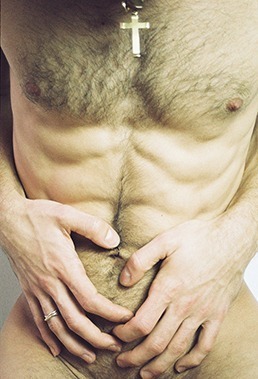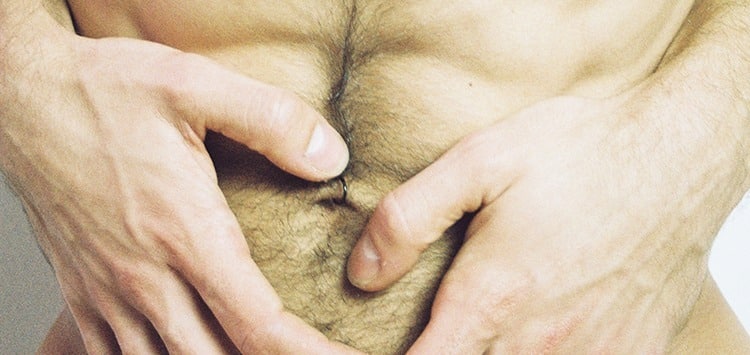Why soft male bellies are hotter than a six-pack
Sebastian Goddemeier
"Trying to achieve a 'dream body' often leads to dissatisfaction, stress, despair and a negative self-image," says one researcher.
If I am as muscular and thin as possible, then I will be happy. That has been one of my beliefs since I was 15 or 16. I went from being a fat child to a thin teenager and finally to a well-trained adult with a six-pack. The price: I went to the gym every day, sometimes even twice, and had a personal trainer who made me fit and tired. I looked good, but I wasn't happy. I still thought I was too fat.
Back then, I was modelling and really wanted to be like the other boys I saw on Instagram and in magazines. That was my ideal. Until I discovered Joseph Wolfgang Ohlert and Jack Strify. One with a pot-belly, the other thin but lean instead of muscular.
The six-pack boys from back then still greet me on Instagram today. White teeth, blonde gel hair, toned bodies. These guys seem to attract followers like the Berlin underground attracts talentless musicians - it's not uncommon for them to have subscribers in the six-figure range. But if you're a stereotype, you're also interchangeable.
It took some time to accept my body. I still don't feel completely comfortable...
So I looked for personalities I could identify with instead of idealising them - and came across photographer Joseph Wolfgang Ohlert. The Berliner writes under a Postin which he holds his stomach folds: "It took some time to accept my body. I still don't feel completely comfortable...". But I think: God, he's hot, and browse through his profile. No six-pack, but dark hair and a beautiful face. Joseph writes about his depression, that he has problems, that his weight fluctuates. He's real and honest.
Later I find musicians and Influencer Jack Strify. The Berliner is queer and also stands by his body as it is. On one of his posts he can be seen in the bathroom in his underwear. Something I would never dare to do. His stomach is thin but soft. I follow up. "I often had the thought that I would delete it again. But so far I've never done that. I no longer want to hide my belly because I might not like it," says Strify when I ask.
Eating disorders and weight pressure in men are rarely talked about. I still suffer from it today: why do six-pack abs put pressure on me? They're just muscles on a stranger's stomach. Do I lack role models like Strify?
I find answers from Anke Kleim. She researches the topic of body image and is the German ambassador for the Australian Body Image Movement. She says: "In the West, we work linguistically with opposites: fat and thin, old or young or tall and short. These terms are often assigned an emotional meaning and are associated with 'good' or 'bad'." These outward appearances are linked to character traits. "A slim person, for example, is seen as particularly self-disciplined in times of overconsumption. Muscles, on the other hand, are seen as symbols of personal strength, vigour, masculinity, assertiveness and power." Power, strength, power! That's what the Kollegah clones in the pumping dens of the republic want. But is there really a connection between mind and body - or is this a fallacy?
For women, appearance was often the only means of achieving social status, according to Kleim. This may also be one of the reasons why weight pressure is often discussed in relation to women - but not for men. "For a long time, these outward appearances played a subordinate role or no role at all for men. As men were the ones who made the decisions in society and held all the important offices, they more or less automatically received a certain amount of social recognition and appreciation for their achievements." Quite the opposite of women, explains Kleim.
Today, in 2020, with advancing emancipation and a more flexible understanding of roles, men have to look for other ways to be accepted by society, explains Kleim. One of the ways, surprise surprise, is through appearance. Men use the outdated ways of women to achieve social status: The six-pack. "This is often seen as an explanation for why men have become more receptive to embodying an ideal image." Economically, it all makes sense: "Companies have capitalised on this because, as we unfortunately know from women, you can make a lot of money with the desire for a perfect appearance and dissatisfaction with yourself."
It turns out that Jack Strify, who today shows off his hairy, soft belly on Instagram, had a similar problem to me: He wasn't happy with his body. "I was one of the first in my class to go through puberty and everyone made fun of my first armpit hair. When I look at holiday pictures today, I see a really thin boy who always perceived himself as too fat." But that's not all.
Instead of accepting his body as it is, Strify looked for role models in Japanese pop culture. He was inspired by anime, which conveys an ideal image of hairless bodies and long legs. Strify has also always felt androgynous. "When I got broad shoulders and more body hair, I continued to curse my body. I starved myself and shaved, even on my arms, even though I have very sensitive skin. Once I even had a skin infection because I ignored it." Strify's story shows what a distorted image of oneself can bring: Self-hatred and insecurities that are very difficult to overcome.
This ideal image, which I also believed in for a long time, is very unhealthy, explains the expert. "Trying to achieve such a supposed 'dream body' or comparing yourself to ideals often leads to dissatisfaction, stress, despair and a negative self-image." We see an ideal that others seem to achieve quite easily - on Instagram, for example. This is followed by the question: If so many men look like this, why don't I look like this? Why doesn't it work? "We have the feeling that we have failed or that we have failed, even though the fault doesn't lie with us. But because of the general assumption that you can do anything if you try hard enough, we take full responsibility and feel bad."
However, this idealised image of the male body brings with it another problem: "Unfortunately, good looks are often mistakenly equated with health. This can be absolutely fatal, as it can overlook the fact that a man needs help." Those who are particularly hard in the gym does not equal self-confidence - He can also be very insecure, driven by self-doubt to fulfil an ideal at all costs. Many studies show that social media drive us even deeper into doubt: "If we are primarily exposed to idealised images, i.e. photos that have been retouched or filtered, then there is a great risk that we will compare ourselves with them and subsequently feel inferior and unattractive."
It is therefore all the more important to choose a model that corresponds to reality and comes closer to your own body in order to create a really positive feeling. I think this feeling comes from similarities rather than differences. Similarities that I find in Joseph and Jack.
Although Strify now has a healthier self-image than he did as a teenager, he still has his problems today: "Sometimes I struggle with my weight, but otherwise I've been able to free myself from a lot of things because I no longer want to look in the mirror and feel bad about myself. I just don't want to do that to myself anymore." Nowadays, when someone criticises his appearance under a picture on Instagram, he goes the other way: instead of doubting himself, he tells himself that he is good the way he is. Strify now likes his hair.
Many people think that body image is an issue that only affects girls.
What Strify describes has become a movement in society that continues to grow. A positive development, says Anke Kleim. With regard to social media, she recommends unfollowing accounts that make you feel bad and instead Follow people who support body positivity. Men too. "Many people think that body image is an issue that only affects girls." Many people can't even imagine that eating disorders also exist in men. "This is a sign of a very deep-rooted social stigma towards men." A stigma that may rest in the belief that it is part of the male image: men have to be strong, muscles symbolise strength.
Pop stars like Lizzo, who stand by their curves, are the faces of a body positivity movement that is turning the image of the thin=beautiful woman on its head. It will certainly be a while before men get there too. "It's great that we live in a time where ideals are being questioned, where there's a big body positivity movement, where fatphobia is a concept. As much as social media seems to reinforce some ideals, I love the networks for giving a voice to so many who haven't been heard for a long time," says Jack Strify. It makes it easier to find people you can identify with, even if mainstream ideals are also present.
According to Anke J. Kleim, the key to a healthy body image is to avoid extremes, accept your own body, exercise, eat healthily from time to time, but don't be too hard on yourself.
People compare, it's in their nature, I think, and I'm glad that there are now role models like Jack Strify and Joseph Wolfgang Ohlert. I would have liked to have had such role models in my youth.
Sebastian Goddemeier Instagram

Photo: Spyros Rennt

